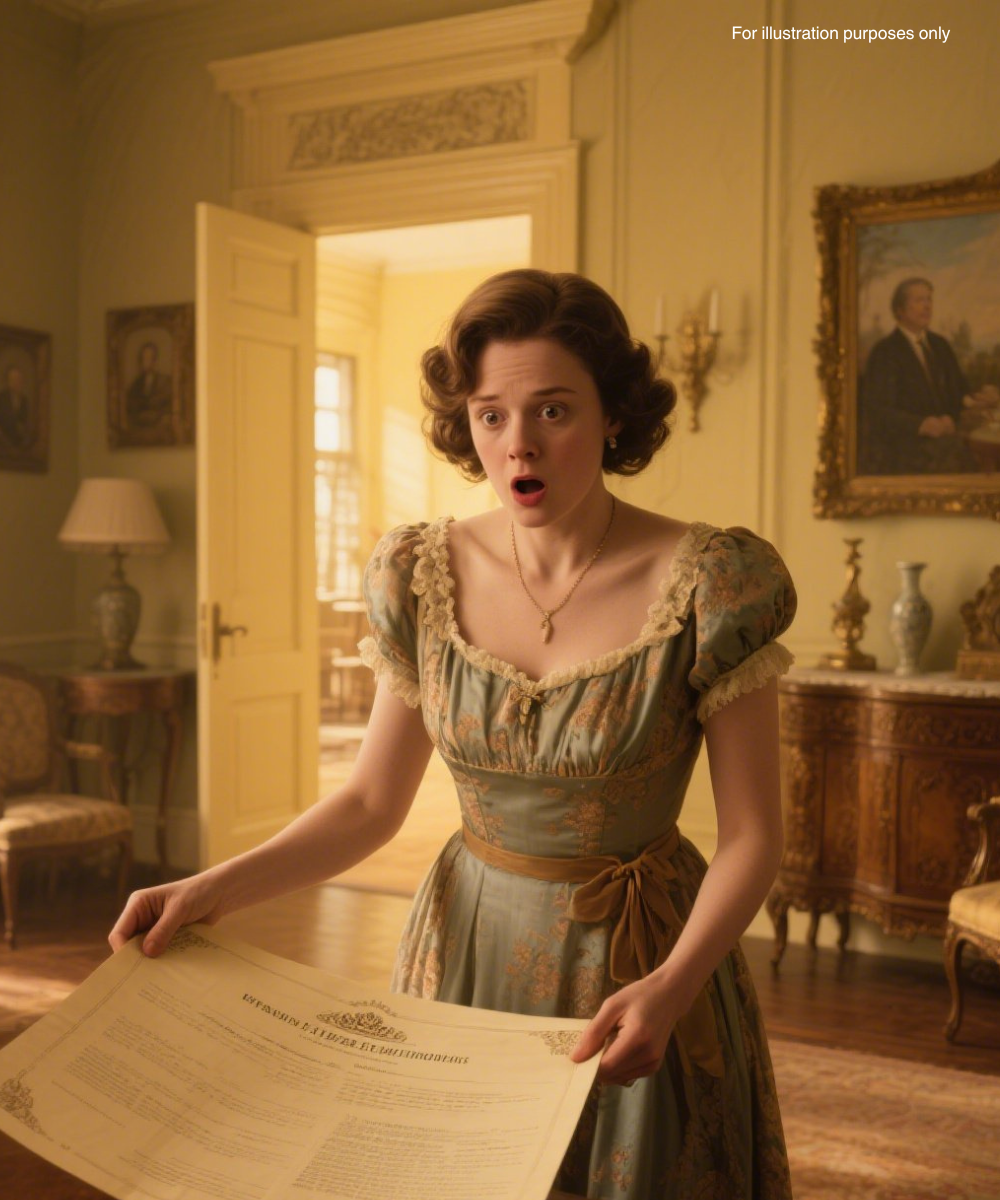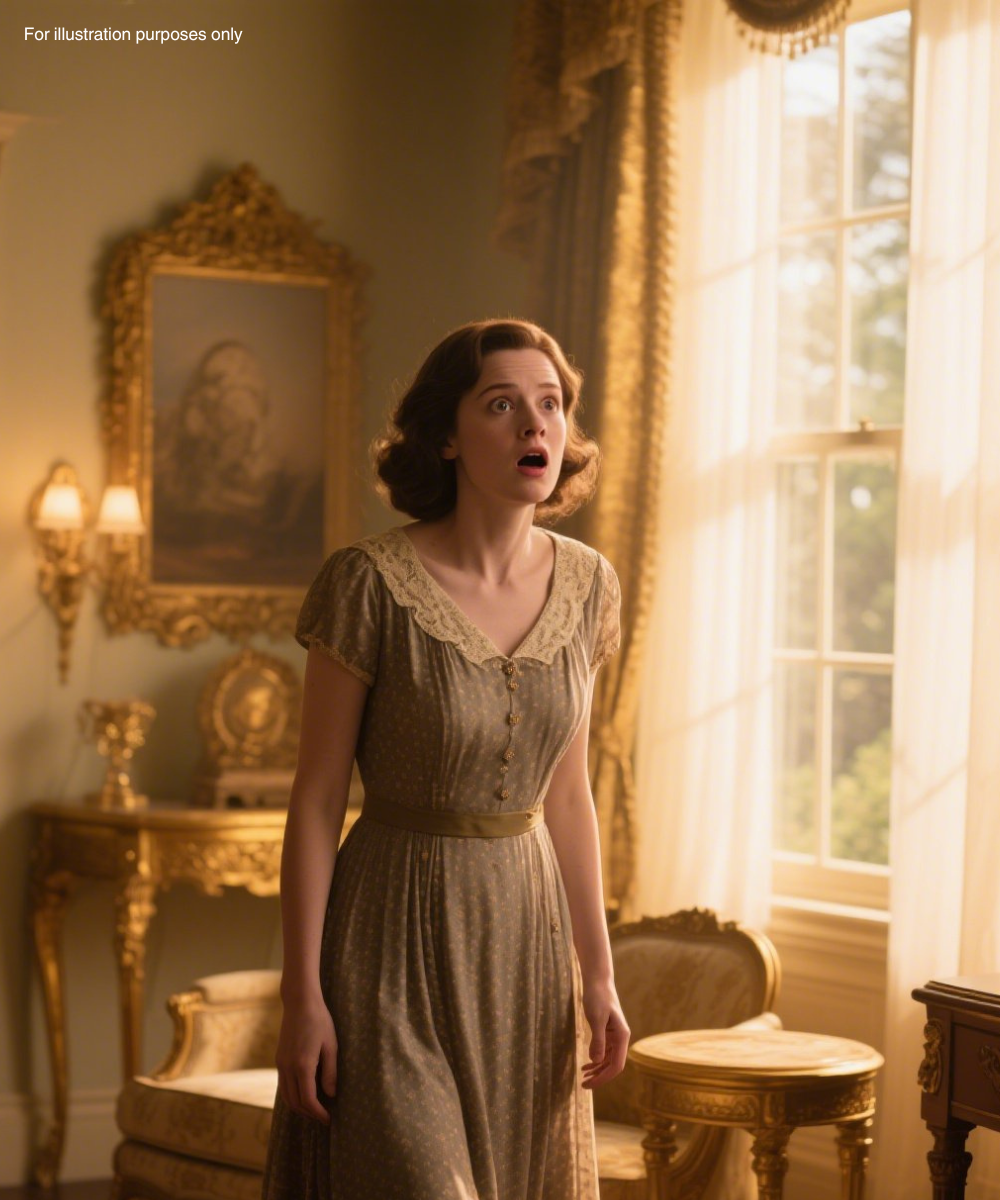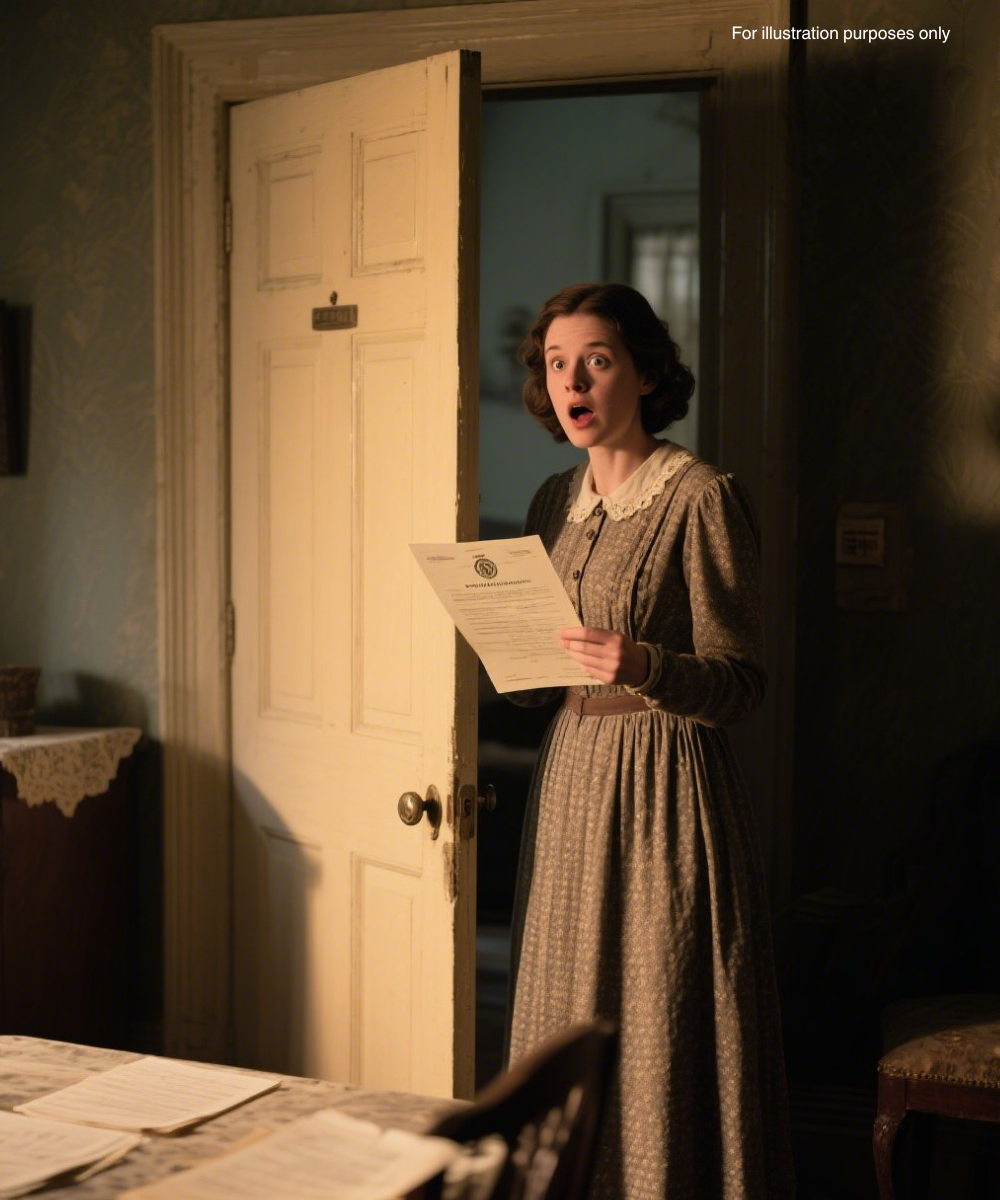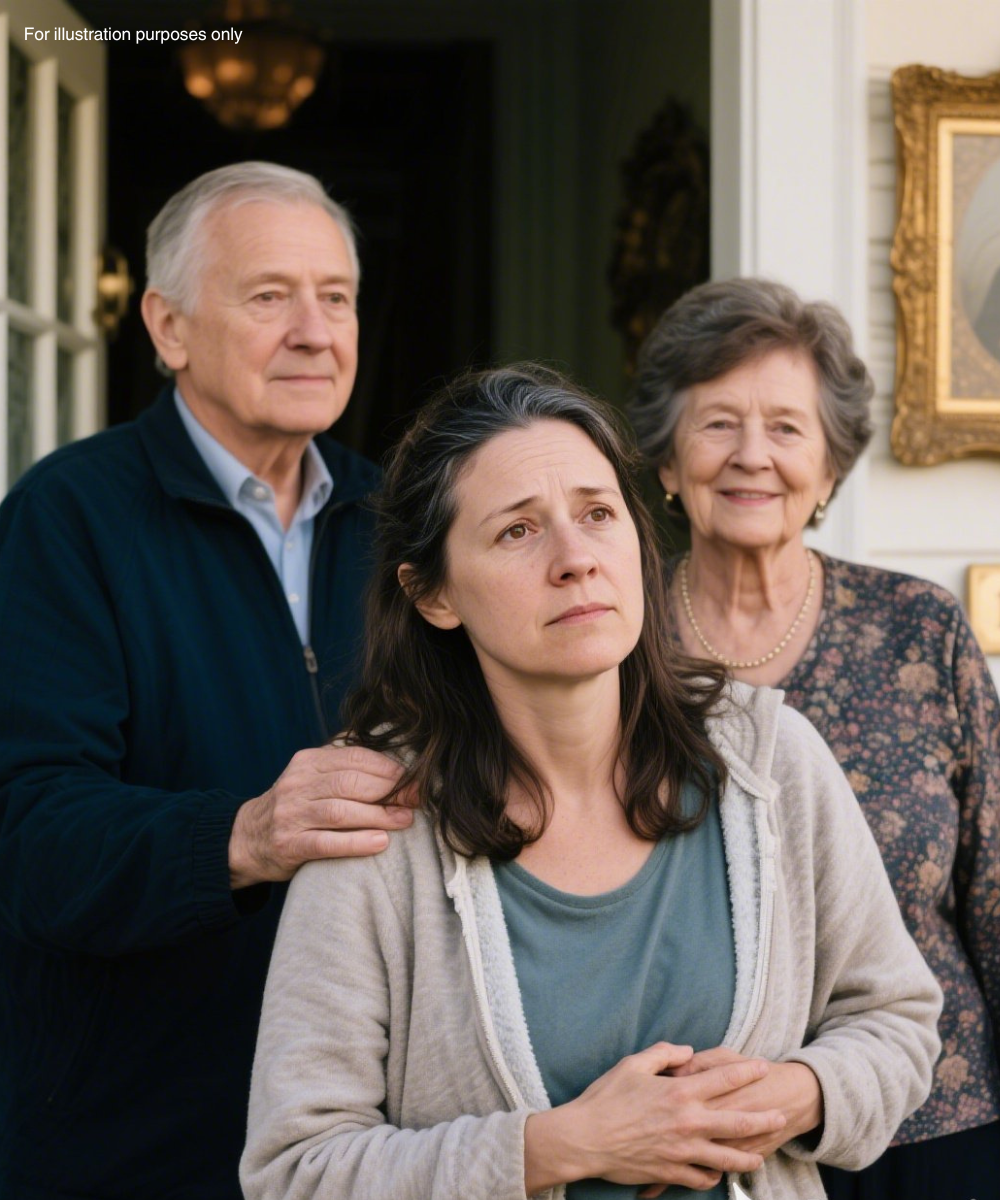“Anna Mikhailovna, your father… he this morning…”
Lyudmila Ivanovna’s voice trembled. I gripped the phone so tightly that my knuckles turned white.
“What’s wrong with him?” I asked, surprised at how unfamiliar my own voice sounded.
“His heart gave out. Mikhail Petrovich passed away in his sleep.”
Fifteen years. Fifteen years had passed since I last saw my father, heard his voice. And now I would never hear it again.
The trip from the regional center to my hometown took three hours. Each kilometer seemed to rewind time — familiar turns, old houses, the scent of autumn air. Everything remained just as it was when I left.
The house greeted me with silence. On the porch stood a woman about forty-five — fair-haired, in a black dress. Next to her was a tall boy, with eyes like my father’s.

“Are you Anna?” the woman asked. “I’m Marina. This is Oleg, your brother.”
The word “brother” sounded strange. I had a brother I had never seen.
“Mom said I have a sister,” Oleg said, looking at me with childish curiosity. “Did you really run away from home at fifteen?”
“Oleg!” Marina scolded him. “Come in, Anna. Lyudmila Ivanovna is waiting for you.”
Inside the house smelled of fresh baking and grief. Lyudmila Ivanovna sat in the kitchen — older, but still as businesslike as ever.
“Annushka, daughter,” she hugged me. “You’ve lost weight. You must not be eating well.”
“I eat fine, Lyudmila Ivanovna.”
“And where do you work?”
“As a hotel receptionist.”
Marina raised an eyebrow:
“A hotel? I thought you left to study, to build a career.”
There was no judgment in her voice — only slight bewilderment. But I felt uneasy.
“Your father often asked about you,” Lyudmila Ivanovna said quietly. “He was glad you lived on your own. Even proud.”
“Proud?” I couldn’t hide the bitterness. “After he kicked me out?”
“He didn’t kick anyone out,” Lyudmila Ivanovna replied sharply. “You left on your own, after that quarrel.”
Marina exchanged a glance with Oleg and stood up.
“We’re going to visit the neighbors; there’s still a lot to do there. You two talk.”
When they left, Lyudmila Ivanovna poured me tea and sat across from me.
“Tell me about Denis,” I asked. “What really happened?”
The old woman sighed:
“Your father had good reasons not to approve of your relationship. Denis Kravtsov was stealing spare parts from the auto repair shop and reselling them. At first, Mikhail Petrovich suspected the workers, then he found out it was him.”
“Why didn’t he tell me?”
“He was afraid you wouldn’t believe him. A fifteen-year-old girl in love thinks her father is a tyrant interfering with everything.”
I was silent, digesting what I’d heard.
“What happened to Denis?”
“Six months after you left, they caught him. He served a year in prison. Then he moved to another city. Nobody’s seen him here since.”
The next day was the funeral. Many people gathered — my father was a respected man. After the cemetery, everyone left except the closest family.
“Tomorrow the notary will come,” Marina said as she cleared the table. “Igor Vasilievich wants to read the will.”
“Why not right away?”
“Father asked to wait until you returned.”
I was surprised. So he knew I’d come? Or just hoped?
That evening we sat together in the kitchen. Oleg was doing homework, Marina was ironing laundry. A normal family life in which I felt like an outsider.

“Tell me about father,” I asked. “What was he like in his last years?”
Marina thought for a moment.
“A good husband, a caring father. Honest, hardworking. Just sad. Especially on your birthday and New Year’s. He used to say, ‘I wonder how my Anna celebrates.’”
“Mom, why did Dad never tell me about Anna?” Oleg asked, looking up from his textbook.
“He did. You were just too young.”
“Then why didn’t she come?”
Marina looked at me:
“You should ask Anna that.”
“Pride,” I answered honestly. “Stupid, childish pride.”
The next morning the notary arrived — Igor Vasilievich, a lean man over sixty, in a strict suit and glasses. Behind him came Viktor Semyonov — my father’s business partner, whom I remembered since childhood.
“Anna!” he smiled broadly. “You’ve become so beautiful! Just like your mother in her youth!”
I shook his outstretched hand but couldn’t smile. Something in his tone made me uneasy.
The notary laid the documents on the table:
“Let us begin the reading of Mikhail Petrovich Petrov’s will.”
He started reading in an official, emotionless voice. The house and auto repair shop were passed on to the family. But then came the surprise:
“Monetary funds totaling eight million rubles, held in a deposit account at Razvitie Bank, are bequeathed to daughter Anna Mikhailovna Petrova.”
Silence hung in the room. Marina turned pale. Viktor frowned. Oleg didn’t understand.
“Eight million?” I asked again. “Where did father get that kind of money?”
“Mikhail Petrovich had been saving income from the auto shop and other deals for fifteen years,” the notary explained. “The account was opened in your name from birth.”
“That’s unfair!” Viktor jumped up sharply. “That money should go to the family! He has a wife and a son!”
“The will is made in accordance with the law,” Igor Vasilievich replied calmly.
Marina was silent, but her face showed shock and pain.
“Marina Stepanovna,” the notary addressed her, “your husband left you a letter.”
She opened the envelope with trembling hands. As she read, her expression changed.
“What does it say?” I couldn’t help but ask.
“He writes that the money was always meant for you. He dreamed you’d come back and wanted you to have a chance to start a new life. To Oleg and me, he left the house, the auto shop, and another account with one and a half million.”
Viktor turned red.
“What about our partnership? Half the auto shop belongs to me! And part of the money too!”
“Do you have documents to prove that?” the notary asked.
“Of course! Mikhail and I worked together for fifteen years!”
After Igor Vasilievich left, a real scandal began. Viktor demanded his share, Marina tried to calm things, Oleg shrank into a corner and stayed silent.
“Anna, you understand you can’t just take it all for yourself?” Viktor said. “You have a family, responsibilities.”
“What family?” I protested. “Fifteen years ago, when I left this house, I had no family!”
“Don’t raise your voice,” Marina intervened. “Oleg can hear you.”
Indeed, the boy was sitting scared. I felt ashamed.
“Sorry,” I said to him. “Adults sometimes argue. But it’s not so scary.”
Oleg nodded, but anxiety remained in his eyes.
That evening, after Viktor left, the three of us stayed. Marina put her son to bed, and I wandered through the house, looking at things I once knew.
On father’s desk lay a folder labeled “Anna.” Curiosity won.

Inside were dozens of letters written in his hand. All addressed to me. None ever sent.
“My dear Annushka, today you turned sixteen. Lyudmila Ivanovna says you’re doing well. I’m so proud of you…”
“Anya, two years have passed. Every day I think: maybe I should have explained about Denis instead of just forbidding you?”
“Daughter, I opened a bank account for you. I save money every month. When you return, you can do with it what you want…”
The letters told the story of a father who didn’t know how to ask for forgiveness but loved immensely. He followed my life through third parties, learned news from mutual acquaintances, rejoiced at my successes, and worried about my failures.
One of the last letters struck me especially:
“Viktor Semyonov insists on investing your money into expanding the auto shop. He promises high profits. But this money isn’t for business. It’s for you. So you can forgive the old fool and start over.”
I cried reading those lines. How many years were lost… How many words left unspoken.
“Anna, where are you?” Marina’s voice called.
Wiping away tears, I went to the kitchen. Marina sat at the table with a cup of tea.
“Can’t sleep?” she asked.
“I found Dad’s letters.”
Marina nodded:
“He wrote them every month. I suggested sending them, but he said: ‘Not now. Anna isn’t ready to forgive me yet.’”
“And how did you feel about it? That he left everything to me?”
She pondered, choosing words:
“At first, I was upset. I thought about Oleg’s future, his education, that we would also need money. But then I understood: your father was a fair man. Oleg gets the house and the business. And you, he gave a chance to start over. After all, you left with nothing.”
“But eight million…”
“Your father denied himself many things for fifteen years to save that money. Didn’t buy a new car, didn’t go on vacation, didn’t renovate. All those years, he thought only of you.”
The next day Viktor came to the house. In his hands — a folder with documents, determination on his face.
“Look, Anna,” he spread the papers on the table. “Here’s the partnership agreement with your father. We invested money equally, so half the profits are rightfully mine.”
I carefully studied the documents. Formally, Viktor did have the right to part of the income.
“Fine,” I said. “But not all eight million. According to these papers, your share is about two.”
Viktor’s face fell.
“Two? Are you serious? I was counting on at least four!”
“By law — two. If you disagree — take it to court.”
He realized blackmail wouldn’t work but wasn’t ready to give up:
“Alright, two it is. But I want to buy Marina’s share in the auto shop. The business must keep growing.”
“The auto shop is not for sale,” Marina answered firmly. “It’s Oleg’s inheritance.”
“Then I’ll leave. Take the equipment. Let’s see how you manage without me.”
When he left, Marina and I discussed the situation for a long time. Without Viktor, the auto shop might just stop — he knew the clients, suppliers, business nuances.
“What shall we do?” she asked.
The decision came at night. By morning, the plan was ready.
“Gather Oleg and Viktor,” I said at breakfast. “I have a proposal.”
An hour later, everyone was at the table. Viktor frowned, Oleg looked confused, Marina was worried.
“Listen,” I began. “Viktor, you’ll get your two million. But you take only the money — the equipment stays. And you keep working at the auto shop.”
“Under what conditions?”
“I’ll buy your share for one million. Marina becomes manager, you’re the chief mechanic. A decent salary and profit percentage.”
Viktor thought.
“What will you do with the remaining money?”
“One million — Oleg’s education. Another million — Marina, for living expenses. I keep four.”
Everyone was silent, digesting what they heard.
“And what about you?” Marina asked.
“I’ll stay here. Help with the auto shop. I have administrative experience — can organize accounting, advertising, find new clients.”
“You want to return to our town?” Viktor was surprised.
“I want to try. Here is my family. Here is father’s business. Maybe it’s time to stop running from the past.”
Suddenly Oleg spoke:
“Will you be my real sister? Won’t you leave again?”
I looked at the tall boy with my father’s eyes and realized: the decision was right.
“I won’t leave, Oleg. I’ll be a real sister.”
A month later everything was finalized. Viktor got his money and agreed to the terms. Marina took a vacation, and together we started reorganizing the auto shop. Oleg got used to the changes and even began helping with small tasks.
I rented an apartment downtown but spent most of my time at my parents’ house. Marina suggested I move in with them, but I decided to wait — we all needed time to truly bond.
Under our management, the auto shop became more efficient. I implemented computer accounting, launched online ads, negotiated contracts to service corporate vehicles. Income grew almost by a third.
At first, Viktor grumbled but eventually acknowledged the improvements. Marina proved a talented manager — easily found common ground with people and defused conflicts.
Oleg started coming after school, helping however he could. He was smart and curious.

“I’ll become an auto mechanic like Grandpa,” he declared once.
“First, study well,” I replied. “Then we’ll decide.”
One evening Marina asked:
“Do you regret coming back?”
“No,” I answered honestly. “For fifteen years, I thought Dad didn’t love me. But he loved me so much he gave up everything for my future.”
“He really wanted you to forgive him.”
“I did. Forgiving myself is harder.”
Lyudmila Ivanovna often visited, bringing pies and news. Once she said:
“Your father would be happy to see you all together. That’s exactly what he dreamed of.”
The money he left changed our lives. But not as you might expect. It didn’t make us rich in the usual sense. It gave us the chance to become a family.
Oleg enrolled in a good school in the regional center. Marina and I took turns driving him there every day. She signed up for accounting courses and now manages bookkeeping for several local companies.
Viktor married a teacher and built a new house. Sometimes he jokes:
“You did the right thing not to give me everything at once. I would’ve wasted it quickly and been left with nothing.”
It’s been a year and a half since I returned home. The auto shop thrives, family ties have strengthened. Oleg simply calls me “sister,” no additions. Marina has become close to me — not a mother, but not a stranger either.
Sometimes I wonder: what if Lyudmila Ivanovna hadn’t called? Would I still be a hotel receptionist, living paycheck to paycheck, saving on everything?
Now I have a business that brings not just income but satisfaction. I have a family. A future I can build.
I keep father’s letters at home. I reread them when it’s hard or when I need advice. They hold so much love and wisdom to last a lifetime.
Money can run out. But family, purpose, a sense of belonging — that’s true wealth.
Lyudmila Ivanovna is right: Father would be happy to see us now. We’ve become the family he dreamed of. It just took fifteen years and eight million rubles to understand that.
